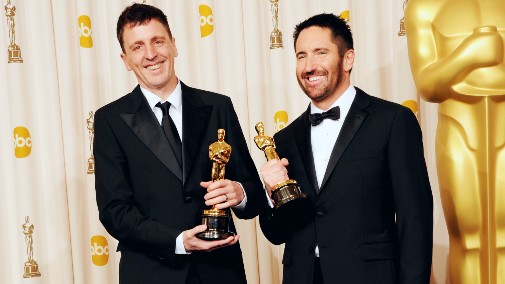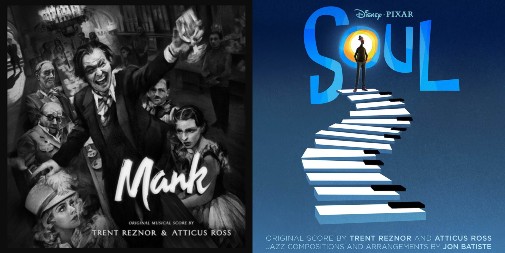
In 2008, the music branch of the Academy caused a stir when it announced that The Dark Knight was disqualified from the Best Original Score race. The reason for this had nothing to do with the use of non-original compositions as it's often the case. Instead, AMPAS had deemed that the picture had too many composers. In total, there were five credited artists – Hans Zimmer, James Newton Howard, Alex Gibson, Mel Wesson, and Lorne Balfe. Even though the first two did most of the soundtrack and the remaining three signed affidavits relinquishing their chance at a nod, the Academy didn't budge.
Since then, rules have changed and then changed back again. Still, the presence of collaborative teams on the Academy's lists of nominees remains rare. In the past decade, only The Social Network, Lion, and Her have earned nominations for featuring the credited work of multiple composers. The first example even won Trent Reznor and Atticus Ross the Oscar. The erstwhile Nine Inch Nails members are back in contention this year. Thanks to Mank and Soul, they might become the first such team to receive a double nomination, effectively competing against themselves…

One must understand that the music branch of the Academy hasn't always been so against collaboratively composed scores. In early Oscar years, the entire music departments of each studio would be honored, though only the heads of said departments got their names acknowledged and, eventually, the trophy. As that practice faded into disuse, the presence of composing teams also started to vanish from the Oscar lineup. Even with 20-wide fields, they were rare. At the same time, some sole artists like Alfred Newman got such affluence of nominations they were often found competing against themselves for Hollywood's most coveted prize.
With this considered, no team has ever achieved that seldom honor that is the double nomination. The last time three people shared one of these nominations was in 1998 with Mulan's Matthew Wilder, David Zippel, and Jerry Goldsmith. As for the biggest team ever nominated, that was the one of 1985's The Color Purple for which a total of twelve artists were recognized. It seems weird that a branch that once nominated a dozen people for the same film would balk at a quintet of composers. However, one should never look for consistent reasoning in AMPAS' music branch. To do so is like searching for ice in the middle of the Sahara.

All this blabber about the minutia of Oscar history serves to explain why a double nod for Reznor and Ross would be such a lovely surprise, a symbolic gesture showing the music branch is willing to go past some of its weirdest hang-ups. There's also the fact that their scores for Mank and Soul are two of the best of the year, working in starkly different ways to complement complicated narratives about artists, memory, and identity. Emulating the styles of the 30s and 40s, Reznor and Ross created a sort of near pastiche electrified by modernist discord for Fincher's movie. It's daring work whose technical virtuosity is hard to ignore.

Soul sees them working with Jon Batiste, who did the jazz arrangements and compositions, to conceive a score in dialogue with itself. Earthly existence and the beyond are contrasted throughout the film by several mechanisms, including design and camera work, suggesting the realism of contemporary New York and an abstraction freed from the laws of physics. This dynamic follows through to the soundtrack, turning the score into a spinning dance between the earthliness of jazz improvisation and a more ethereal amorphousness, a concrete kind of music slamming against a whispery mist of electronic sounds.
What's most interesting about the score is how these paradigms keep shifting and intermingling, breaking the porous barriers established by the piece's first act. There's numbing warmth, a coziness to the electronic rambles that becomes slightly oppressive while never being unpleasant. In contrast, the sounds of Earth can feel chaotic, spiked by jubilant jazz, islands of vitality amidst an ocean of urban cacophony. Gradually, though, Batiste's arrangements become ethereal as well, the two musical idioms birthing a new melodious language, a third possibility for the score of life. Looking back at the musical wonders of these two films, I can say I'll be happy if Trent Reznor and Atticus Ross do indeed make Oscar history next March.

Mank is streaming on Netflix, and you can find Soul on Disney+.